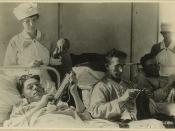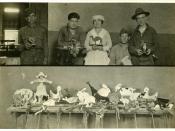CFTO � PAGE �3�
Conceptual Framework for Therapeutic Occupations:
"There is nothing so useful as a good theory"
Michele Freitas
OT 3012
Janis Davis
November 17, 2008
Conceptual Framework for Therapeutic Occupations:
"There is nothing so useful as a good theory"
Occupation is the central idea of the profession of Occupational Therapy. The reason that the profession was founded was to use occupations to enhance every day life (Slagle, 1922). To explain the profession of Occupational Therapy, one must first explain the definition of occupation. There are many different ways to define the word occupation. For example, everything people do to occupy themselves; all doing that has intrinsic or extrinsic meaning, or according to the AOTA, ordinary and familiar things that people do every day. (Jacobs, 2004) The many definitions of occupation and occupational therapy have confused medical professionals for years (Nelson, 2003). The Conceptual Framework for Therapeutic Occupations has provided definitions of many occupational concepts and related them to the profession of occupational therapy.
Given the strengths, weaknesses, key concepts, and application to practice, the conceptual framework for therapeutic occupations (CFTO) is a very influential frame of reference in the profession of occupational therapy.
Founder
CFTO is the conceptual framework for therapeutic occupations. It highlights the core of therapeutic occupation across diverse models of practice and provides an analytical method for comparing and contrasting different models of practice. (Nelson, 1996) David L. Nelson was instrumental in developing this framework. Nelson began his career working beside Frieda Behlen and Anne Mosey; both influenced him in many ways. He learned to develop ideas that would have a long term affect on practice and the profession. Initially he worked with children with autism. Working with these children provoked his thoughts on meaning and purpose. From there he created...


